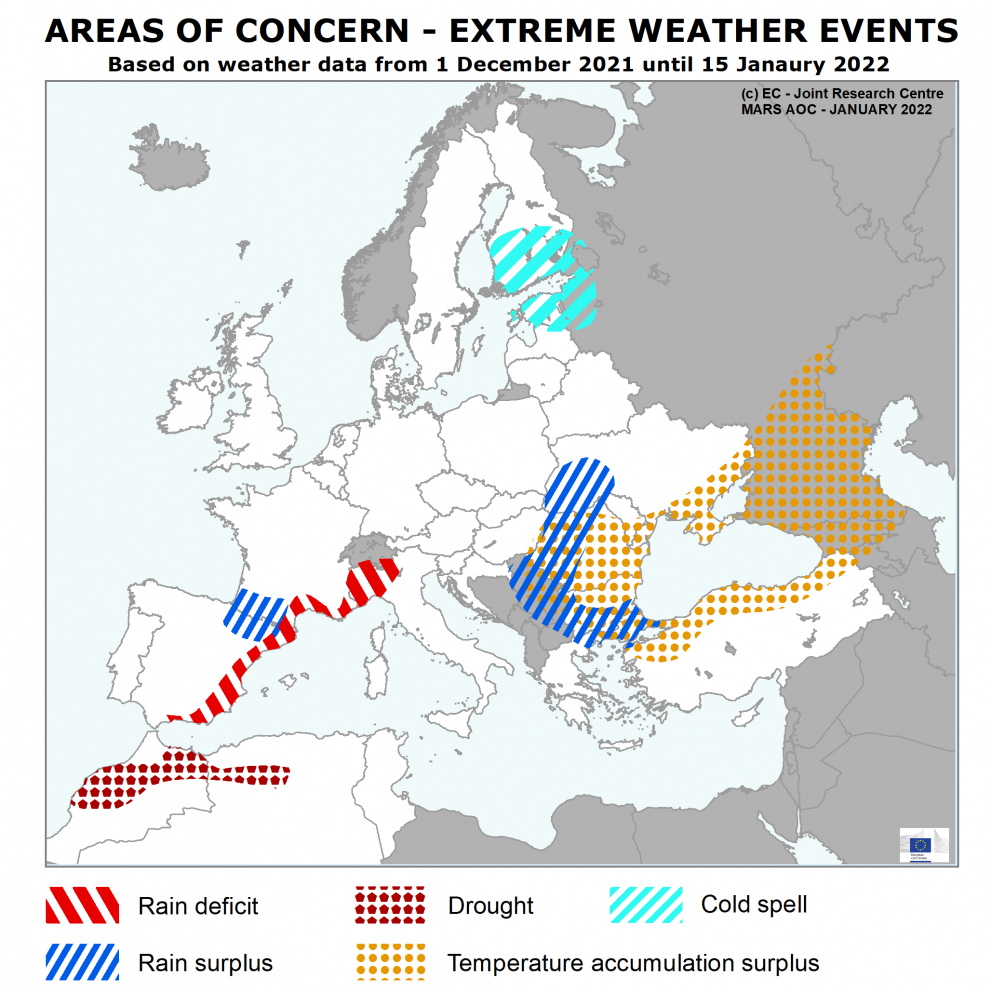
According to the January 2022 issue of the JRC MARS Bulletin - Crop monitoring in Europe, which was published today, winter crops in most parts of Europe benefited from slightly warmer-than-usual temperatures and seasonal to above-seasonal precipitation during the review period (1 December to 15 January).
These conditions allowed stands that were lagging behind in development to partially catch up, and currently, winter crops are generally in fair to good (or very good) condition.
According to our crop model simulations, frost damage to winter cereals has not occurred so far.
Frost tolerance concerns, particularly in the Black Sea region
However, with the exception of northern and central-eastern parts of Europe (where winter crops are almost or fully hardened), the build-up of frost tolerance remains weak due to the mild weather conditions.
The weak hardening of the winter crops in areas around the Black Sea is of particular concern. Precipitation was above average in this region, but mostly in the form of rain, or of snow that has melted since then; thus the snow cover is very limited, and a cold snap would lead to frost damage, especially in late-sown fields.
Drought negatively affects crops in northern Africa
A marked rain deficit extending along the Mediterranean from southern Spain to northern Italy has had no significant negative impact on winter crops so far.
In northern Africa, persisting drought conditions in Morocco negatively impacted the growth and development of winter crops, and rain is urgently needed to sustain adequate crop growth in western and central Algeria.

We need your help: JRC MARS Bulletins Survey
The JRC MARS Bulletins Survey aims to help us better understand how you use the JRC MARS Bulletin. This will allow us to improve our service in the future. It should take less than 10 minutes of your time to complete the survey. All information collected will be anonymous, no personal information is requested.
The survey is available at 2022 JRC MARS Bulletin - Crop Monitoring in Europe Survey
2022 JRC MARS Bulletin calendar
In 2022, the JRC MARS Bulletin Crop monitoring in Europe will be published on: 24 January, 21 February, 21 March, 26 April, 23 May, 20 June, 25 July, 22 August, 19 September, 24 October, 21 November, 19 December.
The JRC MARS Bulletins in the Global outlook series are scheduled for 21 February (North Africa), 23 May (Turkey), 20 June (Ukraine, N. Africa) 27 June (Russia, Kazakhstan), 19 September (Ukraine, Turkey) and 26 September (Russia, Kazakhstan).
Further information
JRC MARS Bulletin - Crop monitoring in Europe, January 2022
The latest information about global agricultural production hotspots for countries with food insecurity risks is available on the JRC’s ASAP (Anomaly hot Spots of Agricultural Production) site.
Related Content
JRC MARS Bulletin - Crop monitoring in Europe, January 2022 Vol. 30 No 1
Details
- Publication date
- 24 January 2022
